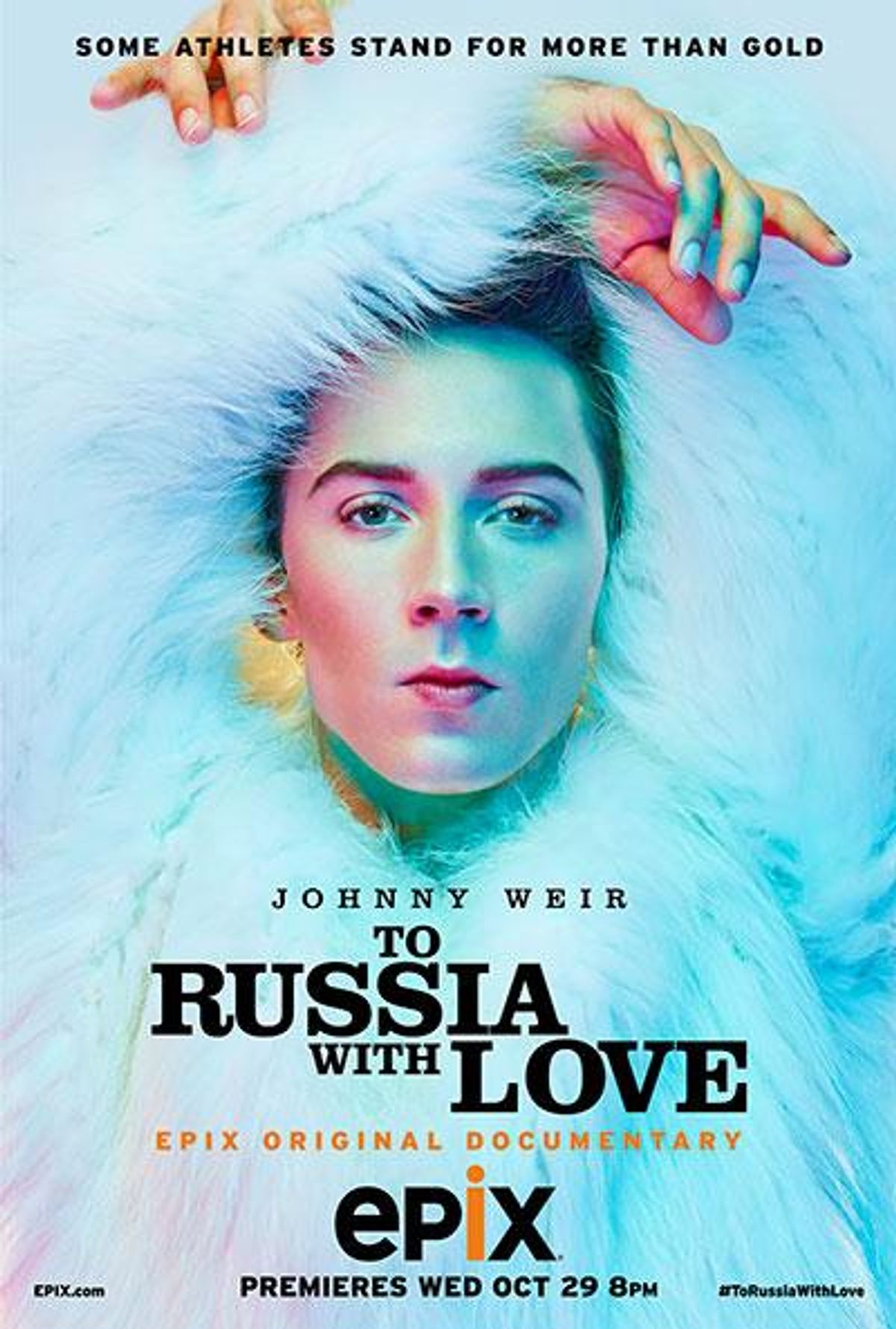The name Johnny Weir is virtually synonymous with over-the-top flamboyance, but the two-time Olympian says he is "not a rainbow flag waver" when it comes to gay activism. Watching the documentary, EPIX Presents: To Russia With Love, which premiered earlier this month, that seems mostly true -- except for one moment that hits hard for Weir, and the viewer.
The documentary profiles the sociopolitical climate in Russia leading up to and during the Olympic Games in Sochi. Weir hesitantance about making any sort of activist statements is on display while working as an NBC commentator during the games, four years after competing as an Olympian in 2010.
He caught criticism from LGBT activists for not overtly taking a stand as an Olympian, and he called a group of LGBT activists protesting him "idiots" during a speaking engagement at Barnard College, leading to an uncomfortable Q&A featured in the documentary.
Weir has had an affinity for Russia his entire life, and it is this long-standing love for Russia that makes the country's policies toward LGBT people particularly difficult for him. The blatant bigotry in Russia leading up to the Games called international attention to LGBT rights issues under Putin.
"In my quest to support the Olympics, I was also on a quest to support Russia, because it's a very misunderstood place and I love it so much," Weir told The Advocate. "I felt that it was my obligation as an Olympian and as an athlete to support the Olympic Games despite what was going on all around them: The new legislation in Russian law concerning LGBT people."
He says one of the reasons he decided to get involved with the film was "to understand the lives of activists, and what activism means and what it entails."
Nevertheless, Weir still feels isolated at times from the LGBT community for what some see as a controversial non-stance. "One of the hardest things in my life is pleasing the gay community, but it's hard to be a cheerleader and be intelligent at the same time," he says in the film. "It's hard to support everyone no matter what when what you believe is very different from what they believe."
Then during the film, Weir meets a gay 17-year-old from Sochi named Vlad, who tells Weir about the abuse he faces daily at school from students and teachers alike. Vlad describes the almost constant humiliation, torture, and abuse, and even how he was stripped and raped by a group of fellow students just for being gay. Learning about what Vlad describes as a "living hell," Weir was visibly moved, and afterwards told The Advocate that "his story was really this thing in the film that really changed my perspective."
Out athletes such as Blake Skelljerup, Anastasia Bucsis, and Belle Brockhoff spoke up about their experience leading to the Games, and others saw the Sochi Games as a platform for an international political stance. But no mass demonstration took place during the Games, something Weir told The Advocate does not surprise him.
"The hardest thing about this debate from an athlete's perspective is explaining to people what the Olympics mean to us," he says. "I never, for once in my competitive career was skating in the middle of a performance thinking about my boyfriend, or the fact that I was gay, or pride parades. I was thinking about landing my jumps and winning medals."
He adds, "I worked for my whole life for six minutes in front of the world at the Olympics, and being gay had absolutely nothing to do with it."
But Johnny wouldn't be Johnny if he didn't do Sochi with a little bit of flair. Jason Collins joked that Weir's fashion does little to hide his sexuality, or, as Weir put it, "I came out of my mom with jazz hands."
Weir and his commentary partner, fellow Olympic figure skater Tara Lipinski, were not only praised for their on-air performance, but also for their scene-stealing high fashion.
"In Sochi I was very much about a statement blazer and a statement necklace," he recalls. "The only constant, because I was doing so much with those, was my leather leggings. I've got three pairs."
After the positive response from specatators for their on-ice knowledge and their amazing looks, Weir and Lipinski were named the network's official ice skating commentators. But would they be open to providing commentary for other sports events?
"We'd love to do the Westminster Dog Show, we'd love to be part of NASCAR, we'd love to be part of the Super Bowl," Weir says. "We have big dreams and ambition, but as far as play-by-play commentary, [figure skating] is where we belong."
Lipinksi and Weir will likely return for commentary at the 2018 Olympic Games in South Korea. And while a shift toward greater LGBT acceptance and inclusion is definitely taking place within the international athletic community many have called for the International Olympic Committee to recognize safety concerns for LGBT people, particularly in the selection of host cities.
"2014 opened the discussion about discrimination in sport, and discrimination about sexual orientation within sport," Weir says. "I think certainly, 2014 will lead to change in that way in the Olympics."
Additional reporting by Michelle Garcia


















































































Fans thirsting over Chris Colfer's sexy new muscles for Coachella